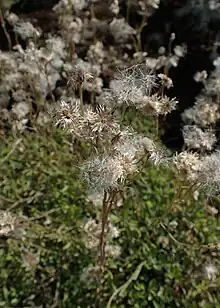| Antennaria howellii | |
|---|---|
 | |
| Canadian pussytoes A. howellii subsp. canadensis | |
| Scientific classification | |
| Kingdom: | Plantae |
| Clade: | Tracheophytes |
| Clade: | Angiosperms |
| Clade: | Eudicots |
| Clade: | Asterids |
| Order: | Asterales |
| Family: | Asteraceae |
| Genus: | Antennaria |
| Species: | A. howellii |
| Binomial name | |
| Antennaria howellii | |
| Synonyms[1] | |
|
Synonymy
| |
Antennaria howellii, the everlasting or Howell's pussytoes,[2][3] is a North American species of plant in the family Asteraceae. It is native to northern Alaska, much of Canada including the Arctic territories, and the northern United States as far south as northern California, Colorado and North Carolina.[4]
Antennaria howellii is an evergreen perennial plant. The form is usually basal rosettes, largely clonally propagated. The basal rosette leaves are 2–4 cm long and 6–12 mm broad, light green and spatulate, with a thin arm and a broad tip with a point. They have woolly white undersides. The flowerheads appear in May, on a stem 15–35 cm tall with smaller, slender leaves 1–4 cm long. It is commonly seen growing under pine stands.[2]
- Antennaria howellii subsp. howellii – western + north-central US, western + central Canada including Yukon
- Antennaria howellii subsp. canadensis – northeastern US, eastern + central Canada including Labrador
- Antennaria howellii subsp. neodioica – Canada, northern US
- Antennaria howellii subsp. petaloidea – Canada, northern US
The plant is named for American botanist Thomas J. Howell, who collected the first known specimens of the plant in 1887.[5]
Conservation status in the United States
The petaloidea subspecies is listed as a special concern and believed extirpated in Connecticut.[6]
Native American ethnobotany
The Nuxalk Nation take a decoction of leaves for body pain, but not pain in the limbs.[7] The Ojibwe take an infusion of the neodioica subspecies after childbirth to purge afterbirth and to heal.[8]
References
- 1 2 The Plant List search for Antennaria howellii
- 1 2 3 Flora of North America Vol. 19, 20 and 21 Page 403 Howell’s pussytoes, antennaire de Howell, Antennaria howellii Greene
- ↑ Calflora taxon report, University of California, Antennaria howellii Greene Howell's pussytoes
- ↑ Biota of North America Program 2014 state-level distribution map
- ↑ Greene, Edward Lee 1897. Pittonia 3(16C): 174 description and commentary in English
- ↑ "Connecticut's Endangered, Threatened and Special Concern Species 2015". State of Connecticut Department of Energy and Environmental Protection Bureau of Natural Resources. Retrieved 13 January 2018. (Note: This list is newer than the one used by plants.usda.gov and is more up-to-date.)
- ↑ Smith, Harlan I., 1929, Materia Medica of the Bella Coola and Neighboring Tribes of British Columbia, National Museum of Canada Bulletin 56:47–68, page 65
- ↑ Smith, Huron H., 1932, Ethnobotany of the Ojibwe Indians, Bulletin of the Public Museum of Milwaukee 4:327–525, page 363
External links
 Media related to Antennaria howellii at Wikimedia Commons
Media related to Antennaria howellii at Wikimedia Commons- "Antennaria howellii". Germplasm Resources Information Network. Agricultural Research Service, United States Department of Agriculture.
- United States Department of Agriculture Plants Profile: Antennaria howellii
- Plants of British Columbia: Antennaria howellii
- Jepson Flora Project: Antennaria howellii
